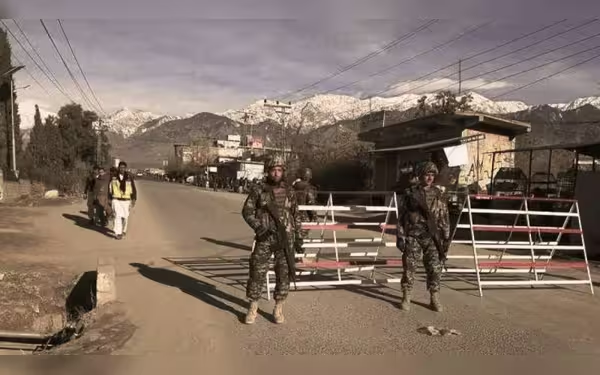Sunday, December 22, 2024 11:02 PM
Parachinar Violence: A Call for Justice and Accountability
- Over 100 lives lost in Parachinar security convoy attack.
- Community faces ongoing sectarian violence since 2007.
- Government silence fuels public outrage and despair.
 Image Credits: thefridaytimes
Image Credits: thefridaytimesA tragic attack in Parachinar claims over 100 lives, highlighting ongoing sectarian violence and the urgent need for justice and accountability.
On November 21, a tragic event unfolded in Parachinar, a city that has long been a victim of violence and sectarian strife. A security convoy, which was supposed to protect over 700 civilians, was brutally attacked, resulting in the loss of more than 100 lives, including over 20 women and children. This horrific incident has left the community in shock and mourning, as many families are now grappling with the aftermath of this senseless violence.
The convoy was on its way to Parachinar to help citizens return home after local terrorists had set up roadblocks since October 11, effectively paralyzing movement in the area. Eyewitness accounts and videos shared on social media reveal the gruesome details of the attack, where terrorists not only fired at the convoy but also desecrated the bodies of the victims. Survivors, including women and children, faced unimaginable brutality, with many being killed in horrific ways. The situation has been exacerbated by a media blackout imposed by authorities, which has silenced coverage of this tragedy.
Parachinar has been trapped in a cycle of sectarian violence since 2007, with various terrorist groups, including Lashkar-e Jangvi and the Tehreek-e-Taliban Pakistan (TTP), carrying out attacks that have claimed over 3,000 lives and injured thousands more. The city has often found itself under siege, with militants attacking ambulances and blocking access to essential supplies. Families have lost loved ones, and children have grown up in fear, witnessing the horrors of violence that have become a part of their daily lives.
Over the years, Parachinar has seen numerous attacks, including a devastating bombing in January 2017 that killed over 50 people. Protests that followed were met with violence from security forces, further deepening the community's grief. Today, there is hardly a home in Parachinar that has not been touched by loss, with many families forced to bury empty graves for their loved ones who could not be retrieved.
The recent attack on the security convoy is among the most horrific incidents in Parachinar's troubled history. The brutality displayed by the terrorists has left deep scars on the community, which has been subjected to repeated acts of violence. Despite the overwhelming evidence of these atrocities, the media coverage has been limited, and the government's response has been inadequate. On November 8, residents staged a peaceful march, demanding security and justice, yet their pleas have largely gone unheard.
The irony of the situation is stark. While the tragedy in Parachinar unfolded, mainstream media focused on political events and trivial matters, leaving the residents to mourn in isolation. The government's silence and failure to protect its citizens have only fueled public outrage. The blocking of roads and lack of accountability for past incidents have left the people of Parachinar feeling abandoned.
The brutal mass murder in Parachinar highlights the chronic challenges of sectarianism and extremist brutality that plague the region. Without accountability, the cycle of violence will continue, putting more innocent lives at risk. It is crucial for the state to break its silence, address these systemic issues, and prioritize the safety of all its citizens. Until then, the people of Parachinar remain trapped in a cycle of fear and violence, yearning for justice and peace.
As an urban planner, witnessing the struggles of my hometown reinforces my belief in the importance of peace and security for sustainable development. Parachinar's geography and infrastructure are vital for its growth, and the resilience of its people reflects their desire for a prosperous and peaceful future. No community can thrive without a solid foundation of peace, and the current situation in Parachinar underscores the urgent need for a conflict-free environment to foster development and well-being.













